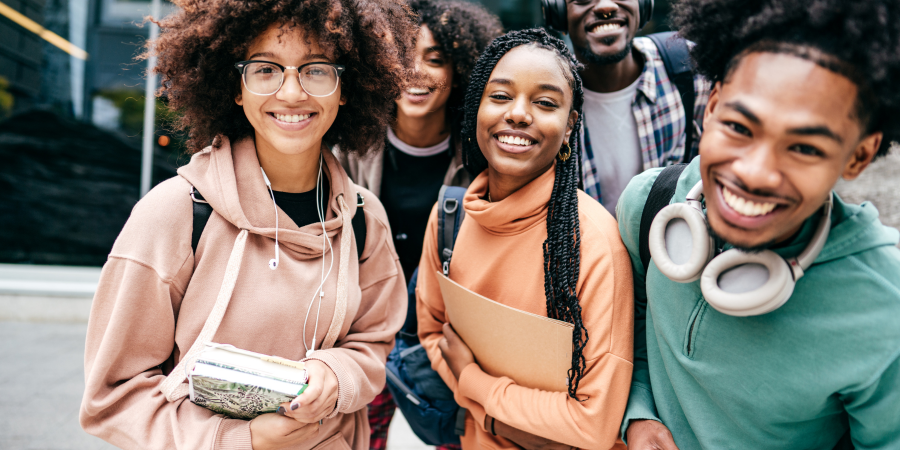Bullying has long been a challenge for schools, affecting the emotional well-being, academic success, and social development of students. Traditional anti-bullying programs focus on identifying and addressing unkind behavior after it occurs. While these reactive measures are often necessary, there’s growing recognition that schools need to take a proactive approach to truly create a positive school culture where bullying can’t thrive.
Wayfinder’s social-emotional learning (SEL) and future-ready skills curriculum goes beyond reactively addressing bullying. By teaching students essential life skills like empathy, self-awareness, and collaboration, our programming equips students to build healthy, meaningful relationships and fosters a community where respect and kindness are the norms.
Why SEL Is Key to Bullying Prevention
Bullying prevention starts with nurturing critical social and emotional competencies. Programs like Wayfinder offer students the tools they need to manage their emotions and social interactions in a positive way. The emotional intelligence students develop through them becomes particularly critical during instances of conflict and volatile stages of adolescence when students are particularly sensitive to social influence.
The Collaborative for Academic, Social, and Emotional Learning (CASEL) notes that students who participate in SEL programs demonstrate improved attitudes toward others, decreased aggression, and greater empathy—all of which are essential for preventing bullying before it begins. As Wayfinder’s MTSS Curriculum Designer Natasha Mihm explains:
“We’re often in a responsive space with bullying, trying to mitigate the effects of something that happened in the community. But with Wayfinder activities and lessons, you’re focusing on skills like empathy, self-awareness, and collaboration, giving students the ability to engage with each other in a more healthy and productive way.”
Teaching Students to Collaborate
Collaboration is a vital skill that helps prevent bullying by encouraging students to work together, share ideas, and build trust with one another. When students engage in collaborative activities, they practice communicating effectively, resolving conflicts, and supporting their peers. This lays the foundation for a school culture where bullying has no place.
Joshua Toopes, a school psychologist at West Aurora School District, explains the importance of focusing on the whole student: “Bullying is that hot-button topic that everybody talks about. I think if you target bullying, it gets a little messy. Whereas, I think Wayfinder can really help us build that student as a whole from the ground up. If we start young and we work our way up, the hope is that we have students who don’t bully at all.”
Wayfinder helps students form positive relationships and contributes to a school-wide culture where everyone feels supported. As Natasha Mihm points out, “It makes it so much more of an effective tool for prevention. It’s really setting those foundational blocks for students in their communities that these skills are important and the way that we treat each other is important.”
Cultivating Self-Awareness + Respect
Though we often think of bullying-prevention skills as interpersonal, helping students understand themselves is a critical step toward healthy campus cultures. Self-awareness enables students to reflect on their emotions, thoughts, and actions. By developing this awareness, students can better understand the impact of their behavior on others, making them less likely to engage in bullying. This internal reflection is key to building an environment that values and encourages kindness and mutual respect.

Students who learn to reflect on their emotions and behaviors are better equipped to manage conflicts and engage in positive social interactions. They learn to take responsibility for their actions, apologize when necessary, and build healthy, respectful relationships with their peers.
Eighth-grade teacher Jadejah Robinson from Winston-Salem/Forsyth County Schools has observed how self-awareness has changed her students: “I would see students quite close-minded to others and unkind in some ways. And I’m seeing them progress and getting better with talking to each other and listening to each other. I know a huge part of that is because we’re implementing Wayfinder.”
Fostering Belonging
One of the most important elements of a positive school culture is ensuring that every student feels like they belong. Students who feel disconnected from their peers or isolated in school are more likely to experience bullying or even engage in it themselves. The benefits of belonging for youth are well documented: it supports self-esteem, self-efficacy, positive identity formation, stress management, and overall life satisfaction. Belonging reduces experiences of loneliness, emotional distress, depression, mental illness, and suicidal thoughts and behaviors.
Wayfinder’s lessons are designed to create inclusive school communities where students feel safe, valued, and connected. Erwin, a senior at Norman High School in Oklahoma, shared how Wayfinder helped him find his place at school: “Wayfinder helped in finding a sense of belonging at the school just by knowing that I’m not alone.”
The feeling of belonging that Wayfinder promotes goes hand-in-hand with the development of social skills. When students feel accepted and part of a community, they are more likely to show respect for others and to be more open to learning new perspectives.
Anthony, a junior at David Douglas High School in Oregon, shared, “I think Wayfinder as a whole just kind of helped me be more open, just talk to people more, be more communicative.” The openness and curiosity students develop through their interactions with Wayfinder and each other encourage more empathetic and productive approaches to navigating differences. Ultimately, these approaches can help address the root causes of bullying.
Building Empathy + Emotional Intelligence
Empathy—the ability to understand and share the feelings of others—plays a clear and crucial role in bullying prevention. It enables students to see their peers as individuals with their own thoughts and feelings, reducing the likelihood that they will act out in ways that cause harm. In fact, empathy training has been shown to decrease bullying behavior in schools by fostering stronger interpersonal connections.
 Natasha Mihm highlights the importance of this approach: “We’re really helping [students] develop the skills to even prevent bullying in the first place—helping them build spaces where they engage in healthy ways with each other.” By practicing empathy through structured activities, students learn to recognize how their words and actions affect others. This is especially important for younger students who may not fully understand the consequences of their behavior, as well as for students learning to self-regulate and respond intentionally in moments of conflict or emotional tension.
Natasha Mihm highlights the importance of this approach: “We’re really helping [students] develop the skills to even prevent bullying in the first place—helping them build spaces where they engage in healthy ways with each other.” By practicing empathy through structured activities, students learn to recognize how their words and actions affect others. This is especially important for younger students who may not fully understand the consequences of their behavior, as well as for students learning to self-regulate and respond intentionally in moments of conflict or emotional tension.
Seventh grade teacher Sarah Medrano of Winston-Salem/Forsyth County Schools has witnessed the impact of Wayfinder firsthand. She says, “Through Wayfinder, [my students have] been able to identify their feelings, empathize with the feelings of others, and now I see them giving fist bumps to each other instead of punching each other. Relationships have greatly improved. They care more about each other.”
Wayfinder’s Long-Lasting Impact on Well-Being
As students grow into emotionally intelligent, compassionate individuals, the likelihood of bullying decreases and the overall well-being of the school community improves. In this way, Wayfinder isn’t just a set of lessons; it’s a philosophy that transforms the way students interact with one another and impact the community around them.
As Joshua Toopes says, “Wayfinder turned into something that we are, not something we do.” By creating a positive school culture built on kindness, respect, and understanding, Wayfinder helps students develop the social and emotional skills they need to engage in positive relationships and contribute to a healthy school community.





